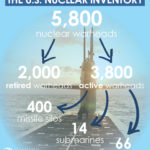At its peak, the United States had more than 31,000 nuclear weapons in its stockpile. Now, thanks to various arms control agreements and unilateral reductions, the United States has a total inventory of around 5,428 nuclear warheads.
Hidden Dangers of the Ukraine Crisis
By John Erath In a previous post, I argued that Russia was using nuclear deterrence to enable its aggression against Ukraine. Over the last six weeks, tensions have not subsided, with Putin making demands that would alter the rights of sovereign states to determine their own security and western governments warning of consequences should Russia […]
Nuclear nations should pledge more than ‘cheap’ talk, Hiroshima survivor says
Senior Policy Director John Erath was quoted in The Analyst discussing a recent pledge signed by five nuclear states – the United States, Russia, China, the UK and France – agreeing that a nuclear war “cannot be won and must never be fought.” The January statement is the first time the other three nuclear powers […]
North Korea is testing hypersonic weapons. Should the West be worried?
Executive Director John Tierney was quoted in an NPR article about North Korea’s recent flurry of missile tests. John Tierney, a former Massachusetts representative who now serves as the executive director for the Center for Arms Control and Non-Proliferation, calls hypersonics “shrug worthy,” adopting a term coined by writer Fred Kaplan in a column in Slate last year […]
Front and Center: January 15, 2022
IT’S OUR SISTER ORGANIZATION’S 60TH ANNIVERSARY! Congratulations to our sister organization, Council for a Livable World, as it celebrates its 60th anniversary this year! Nuclear physicist Leo Szilard founded the Council in 1962, having spent his time since the nuclear age began trying to rid the world of the weapons he helped create. From this […]

